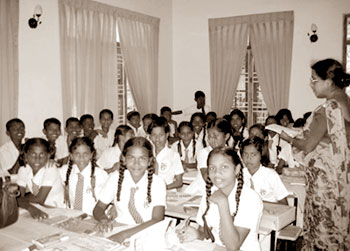Critical issues of education in Sri Lanka
by Prof. S. T. Hettige
Education is one of the most important institutions in modern
societies. It has wide ranging social, economic, cultural and political
implications. In this sense, education is not simply a matter of
providing basic skills and credentials to children and youth. Yet, the
critical point is where the authorities responsible for education are
conscious of these wide implications.
 When we look at the country's education system today, it becomes
obvious that the educational authorities are at best indifferent towards
such matters. The purpose of this short essay is to highlight several
critical issues that deserve serious attention. They are language
skills, life skills, citizenship education, equity and dysfunctional
peeking order of subjects. When we look at the country's education system today, it becomes
obvious that the educational authorities are at best indifferent towards
such matters. The purpose of this short essay is to highlight several
critical issues that deserve serious attention. They are language
skills, life skills, citizenship education, equity and dysfunctional
peeking order of subjects.
Complete neglect of teaching languages besides the mother tongue for
over fifty years has deprived generations of youth of the ability to
communicate and access information using a second language. All efforts
that have been made to rectify the situation have failed and there are
no signs of any concerted effort being made at present.
The country's young population is divided on linguistic lines and
they remain almost isolated from each other wherever they are. The
result is that public institutions are also segmented on ethno-
linguistic lines. For instance the media, state institutions, political
parties, educational establishments are all divided on ethno-linguistic
lines.
Inability to use a second language has restricted youth of the
ability to access information from various sources, be it internet,
journals, seminars and other publications. This has promoted what been
referred to as the 'frog in the well syndrome'. It has also contributed
to the formation of ethno-linguistic constituencies.
One of the adverse effects of this is the birth of a generation who
could not work in any other parts of the country other than in those
areas where their native language is spoken and in which the affairs of
the state conducted.
Our school system continues to de-skill children and youth. Schools
impart almost no life skills today, as they did several decades ago.
Education is almost synonymous with examinations and certificates. What
can a youth with an A.L. certificate do?. As the entire emphasis is on
examination, children are also interested in passing examinations.
They do not acquire necessary skills that is expected of them at
relevant levels. Since education does not impart the necessary life
skills, it is no wonder that Sri Lankan parents aspire to send their
children abroad for education.
The education system today does not prepare children for social
citizenship. Children socialize into separate ethno- linguistic worlds
that rarely intersect in real life. Basic values and ideas connected
with modern society such as secularism, equality and fair play,
tolerance of diverse religion and culture have not been inculcated in
them by the system of education.
So, the result is that the citizen who has little or no understanding
of divers ethnic-linguistic groups.
The children who are educated under such a system of education tend
to implicitly believe in archaic prejudices against other
ethno-linguistic groups, indirectly hampering any effort towards ethnic
harmony. Gross failure to build citizenship by the system of education
would lead to formation of split identities.
The identities likely to be formed are those of regional and
linguistic nature rather than national.
The equity issue has adversely affected the education sector in Sri
Lanka. It has virtually denied rural youth of equality of opportunity
and a decent education. This, in turn, contributed the widespread
disenchantment with the system, exposing them as easy victims to
anti-systemic elements.
Another issue which affects the education sector is the dysfunctional
peeking order of subjects. Over preference of certain subjects led not
only to relegate liberal art to the lowest strata of academic studies
but also adversely affected in reducing the standards as bright persons
prefer to take up favoured disciplines.
The topic is open for debate |
